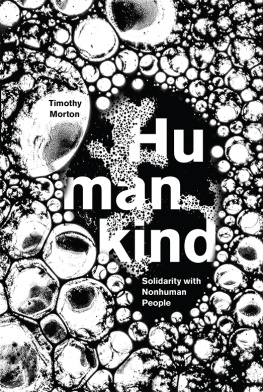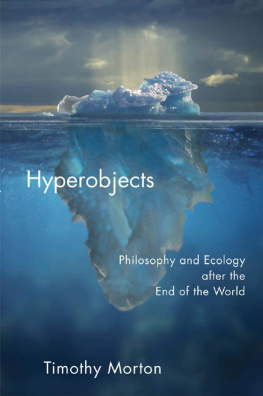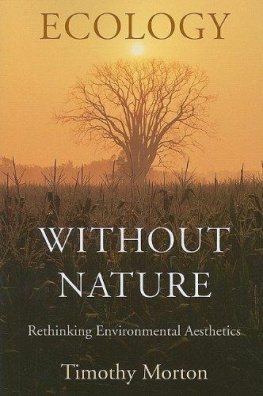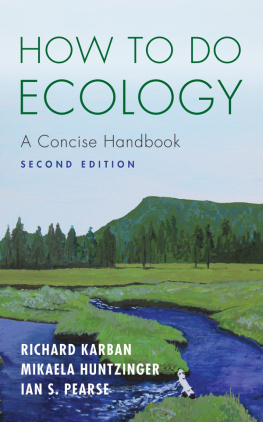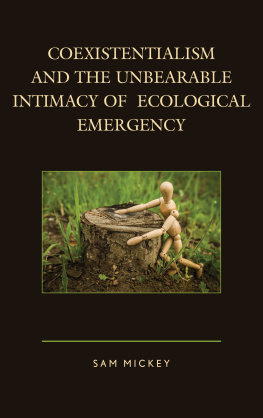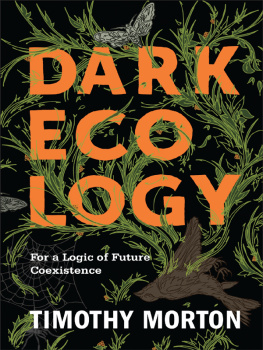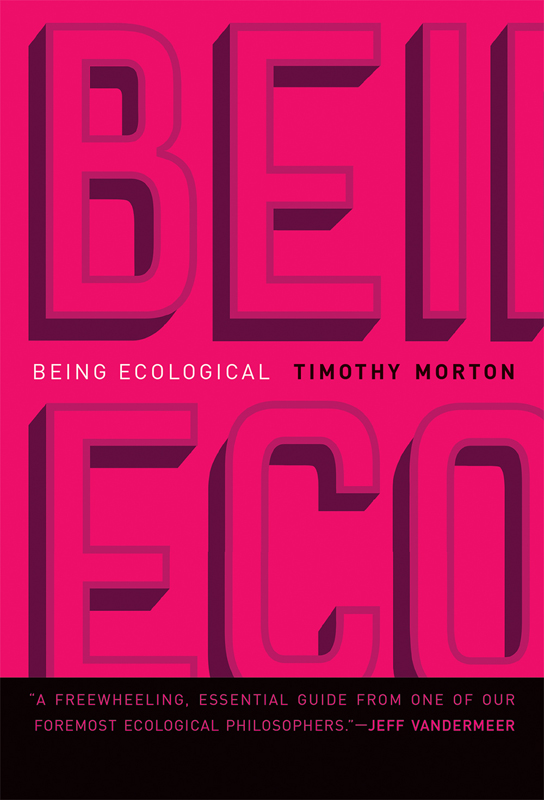The author has asserted his moral rights.
All rights reserved. No part of this book may be reproduced in any form by any electronic or mechanical means (including photocopying, recording, or information storage and retrieval) without permission in writing from the publisher.
This book was set in Stone Serif by Westchester Publishing Services. Printed and bound in the United States of America.
Names: Morton, Timothy, 1968 author.
Title: Being ecological / Timothy Morton.
Description: Cambridge, MA : MIT Press, [2018] | Includes bibliographical references and index.
Identifiers: LCCN 2017040950 | ISBN 9780262038041 (hardcover : alk. paper)
Subjects: LCSH: Ecology--Popular works.
Grass is hard and lumpy and damp, and full of dreadful black insects.
Acknowledgments
Thank you so much to my editors, Thomas Penn and Ananda Pellerin, for their tireless help. In particular, thanks to Ananda for her incredibly detailed and insistently kind editing. Writing in the world of scholarship can be a very isolating affair, so Im very grateful to have been seen.
Thanks to everyone I gave lectures to or who participated in seminars or workshops or dialogues in the last year. Those occasions are my lab, and I simply couldnt think without them. Thanks to my Dean of Humanities at Rice University, Nicholas Shumway, whose support of me has been one of the miracles of my life. Thanks to my fantastic research assistants, Kevin MacDonnell and Randi Mihajlovic, whose invaluable work enriched this project so much. And thanks again to Kevin for assisting me in every respect; its not an exaggeration that I just couldnt do my job without his unstinting and incredibly generous support. Thanks to everyone who helped in all kinds of ways, and especially Heitham Al-Sayed, Ian Bogost, Paul Burch, Federico Campagna, Olafur Eliasson, Bjrk Gudmundsdottir, Sofie Grettve, Lizzy Grindey, Graham Harman, Douglas Kahn, Jeffrey Kripal, Ingrid Luquet-Gad, Edouard Isar, the Morton family (Garth, Jasmine, Charles and Steve), Yoko Ono, Sunny Ozell, Andrea Pagnes, Sabrina Scott, Priscilla Elora Sharuk, Emilija Skarnulyt, Verena Stenke, Marita Tatari, and Cary Wolfe.
Special thanks to Yoko Ono for permission to reproduce part of her work THIS IS NOT HERE (p. 68).
This book is dedicated to my cousin, the artist Lindsay Bloxam, and her partner, the artist Paul Johnson. Their genius is to suspend the heavy hand of judgment and open up the world to curiosity, wonder and lightness. We could do with a bit here in the realm of ecological thought.
Introduction: Not Another Information Dump
Dont care about ecology? You might think you dont, but you might all the same. Dont read ecology books? This book is for you.
Its understandable: ecology books can be confusing information dumps that are out of date by the time they hit you. Slapping you upside the head to make you feel bad. Shaking your lapels while yelling disturbing facts. Handwringing in agony about What are we going to do? Horseshoe-in-a-boxing-glove propaganda. This book has none of that. Being Ecological doesnt preach to the eco-choir. Its for you: maybe youre in the choir but only sometimes, or maybe you have no idea what choirs are, or maybe you dont care at all. Rest assured this book is not going to preach at you. It also contains no ecological facts, no shocking revelations about our world, no ethical or political advice, and no grand tour of ecological thinking. This is a pretty useless ecology book, in fact. But why write something so useless in such urgent times? Have I never heard of global warming? Why are you even reading this? Well, the truth is you might already be ecological, you just didnt know it. How, you might ask? Lets begin and find out.
What This Book Is About
In this Introduction, Ill set out the general approach of the book. In the first chapter, I will finger paint a way of feeling ourselves around the age we live in, which is one of mass extinction caused by global warming. In the second chapter, well get on with considering the object of ecological awareness and ecological thinking: the biosphere and its interconnections. In the third chapter, well look at what sorts of actions count as ecological. And in the fourth, well be exploring a number of current styles of being ecological.
Along the way Im going to make you familiar with my style of doing philosophy. If that style were a movie directed by me, its producer would be Graham Harmans object-oriented ontology (more on that soon), and its executive producers would be the philosophers Immanuel Kant and Martin Heidegger.
For now, in this Introduction, Im going to show how this is not an ordinary book about ecology, because its trying very hard to avoid a seductive rhetorical mode: the guilt-inducing sermon. How? Lets begin with the fact that this book is largely free of facts. I just thought Id put that in up front myself, before the critics do it.
When you write a book about ecology, whether or not you are a scientist talking about ecological issues, you seem to have to put a lot of facts in. It feels like a requirement of the genrea genre being like a kind of horizon, a horizon of expectation. We expect tragedies to make us feel certain emotions (Aristotle thought these were fear and pity), and comedies are supposed to make you smile. There is a genre of the kind of writing you find in your passport. And there is definitely a genre of ecological speechseveral genres in fact.
Big Other Is Watching You
A genre is a sort of world or possibility space. You can make certain moves within that space, and as long as you stay in the space, you are performing something in that generic mode. For example, you probably have a certain way of being at a party, and this might be different from your way of being at a company meeting. You might have a certain way of reading the news, and you definitely have certain ways of following (or ignoring) the latest clothing fashions.
Genres are slippery animals. They have to do with what some philosophy calls the Otherand when you try to point directly at the other, it (or she or he, or they) disappears. The othermy idea of your idea of her idea of their idea of his idea of my idea of their idea If youve ever been in a band you will know what a perilous concept this is. If you write music tailored to what you think people want in the record store, you might end up paralyzed by indecision. This is because the realm of the other is like a network or web of assumptions, prejudices, and preformatted concepts.
Now there are preformatted concepts that are obvious to all of us, or at least they can easily become so. If you want to know the kind of ravioli they make in Florence, then youre going to be able to look that up. Florentine ravioli mode is something you can find out aboutindeed, nowadays you can just Google it. To Google


